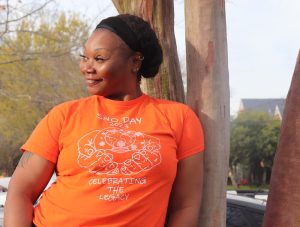At a meeting last month, City Council members heaped praise on Durham Police Chief Cerelyn “C.J.” Davis for a dramatic drop in violent crime.
Durham Mayor Steve Schewel interrupted her presentation to express his glee.
“I want everybody in this room and everybody who’s watching this at home to wrap their mind just for a minute around that 28 percent figure,” Schewel said. “That is a big number. I just want to congratulate you.”
Davis attributed the drop to the department’s focus on more uniformed police on patrol, an emphasis on catching repeat criminals, more coordination with prosecutors and better engagement in the community.
But she left out what criminologists say is probably the biggest factor.
N.C. State criminologist James Brunet said the biggest influence in the drop in crime isn’t about cops or uniforms: it’s a decline in poverty.
And Durham’s good news came with an asterisk: Although robberies declined by 36 percent and aggravated assaults fell by 25 percent, homicides rose from 10 in the first six months of 2017 to 14 in the same period this year.
Durham police said they did not think the rise in homicides indicated a concerning long-term trend, noting that last year’s mark of 10 killings was a particularly difficult figure to beat after it fell from 21 homicides in the first half of 2016. Brunet cautioned against reading too much into quarterly statistics when the numbers are small, but acknowledged that poverty’s effect on different crime categories can vary.
“In the worst situation, you could have a shooting situation, a domestic violence situation where three or four individuals are killed, and that could really move the quarterly numbers pretty significantly, but it’s not indicative of the public safety within a city,” Brunet said. “The factors that lead to those different types of crimes are very different, like an assault versus a drug homicide.”
Criminologist Barry Latzer wrote in an analysis in the Daily Beast last October that crimes like murder are quarrel-based, stemming from anger or gun-fueled disputes. Robberies are often more correlated with economic factors, when poor people resort to stealing money and property by force out of desperation. And Durham’s poorest residents are often being pushed out by the rapid redevelopment of the city.
The Herald-Sun reported this year that the median household income in Durham County has increased 8.1 percent since 2010, and it has risen by more than 40 percent in six of the county’s 60 census tracts. As home prices and rents have soared, people who could no longer afford to live in Durham may have moved to poorer neighboring areas like Person County to the north and Chatham County to the south.
Cities in those counties have not been as fortunate with the direction of their recent crime rates. Lieutenant Shorty Johnson said the Pittsboro Police Department had nine violent crimes in 2017 and has seen seven through the start of September this year, on a similar pace for the full year. Roxboro does not differentiate between violent crime and property crime and does not track quarterly statistics, but total crime in the town rose nearly 10 percent from 2016 to 2017.
But even if the economy is the driving force in the declining crime rate, Brunet said police may deserve a little bit of the credit. He noted that police initiatives in community support have been shown to have a measurable impact in cities like High Point, N.C., and Boston, Mass., and may have contributed to some of the drop in Durham.
“Police can have a role in curtailing crime. It may not be the most important factor. Poverty and other conditions would be more prevailing,” Brunet said. “But if they’re instituting a new program that’s directed at gang violence, that could potentially impact violent crime rates.”
Davis revealed that a new community engagement unit assigning 10 officers to McDougald Terrace this year helped cause a 62.5 percent drop in violent crime in the southern Durham public housing complex. The officers in the unit hosted a community clean-up event to increase visibility, and they also ran safety education programs and intervention initiatives.
“Sometimes you hit a sweet spot,” Davis told the City Council. “Officers have been remaining vigilant and visible.”
Councilmember Mark-Anthony Middleton asked Davis how to replicate that unit and assumed the answer would be more money and staff. Davis pushed back on his cynicism.
“I don’t think it’s money,” she said. “It’s individuals that know how important it is to have good relationships with the community members that live there and those little kids that live in that community, who in another five to 10 years will be adults and have some impression of who police are.”



Comments are closed.